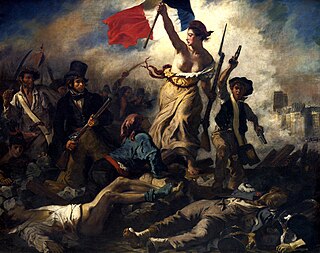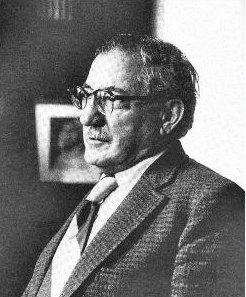Related Research Articles
Nationalism is an idea and movement that holds that the nation should be congruent with the state. As a movement, it tends to promote the interests of a particular nation, especially with the aim of gaining and maintaining the nation's sovereignty (self-governance) over its perceived homeland to create a nation-state. It holds that each nation should govern itself, free from outside interference (self-determination), that a nation is a natural and ideal basis for a polity, and that the nation is the only rightful source of political power. It further aims to build and maintain a single national identity, based on a combination of shared social characteristics such as culture, ethnicity, geographic location, language, politics, religion, traditions and belief in a shared singular history, and to promote national unity or solidarity. Nationalism, therefore, seeks to preserve and foster a nation's traditional culture. There are various definitions of a "nation", which leads to different types of nationalism. The two main divergent forms identified by scholars are ethnic nationalism and civic nationalism.

Romantic nationalism is the form of nationalism in which the state claims its political legitimacy as an organic consequence of the unity of those it governs. This includes such factors as language, race, ethnicity, culture, religion, and customs of the nation in its primal sense of those who were born within its culture. It can be applied to ethnic nationalism as well as civic nationalism. Romantic nationalism arose in reaction to dynastic or imperial hegemony, which assessed the legitimacy of the state from the top down, emanating from a monarch or other authority, which justified its existence. Such downward-radiating power might ultimately derive from a god or gods (see the divine right of kings and the Mandate of Heaven).

Gerald Robert Vizenor is an American writer and scholar, and an enrolled member of the Minnesota Chippewa Tribe, White Earth Reservation. Vizenor also taught for many years at the University of California, Berkeley, where he was Director of Native American Studies. With more than 30 books published, Vizenor is Professor Emeritus at the University of California, Berkeley, and Professor of American Studies at the University of New Mexico.
Postcolonial literature is the literature by people from formerly colonized countries, originating from all continents except Antarctica. Postcolonial literature often addresses the problems and consequences of the decolonization of a country, especially questions relating to the political and cultural independence of formerly subjugated people, and themes such as racialism and colonialism. A range of literary theory has evolved around the subject. It addresses the role of literature in perpetuating and challenging what postcolonial critic Edward Said refers to as cultural imperialism.

Pan-Turkism or Turkism is a political movement that emerged during the 1880s among Turkic intellectuals who lived in the Russian region of Kazan (Tatarstan), Caucasus and the Ottoman Empire, with its aim being the cultural and political unification of all Turkic peoples. Turanism is a closely related movement but it is a more general term, because Turkism only applies to Turkic peoples. However, researchers and politicians who are steeped in the pan-Turkic ideology have used these terms interchangeably in many sources and works of literature.
Ethnic studies, in the United States, is the interdisciplinary study of difference—chiefly race, ethnicity, and nation, but also sexuality, gender, and other such markings—and power, as expressed by the state, by civil society, and by individuals.

Afrocentricity is an academic theory and approach to scholarship that seeks to center the experiences and peoples of Africa and the African diaspora within their own historical, cultural, and sociological contexts. First developed as a systematized methodology by Molefi Kete Asante in 1980, he drew inspiration from a number of African and African diaspora intellectuals including Cheikh Anta Diop, George James, Harold Cruse, Ida B. Wells, Langston Hughes, Malcolm X, Marcus Garvey, and W. E. B. Du Bois. The Temple Circle, also known as the Temple School of Thought, Temple Circle of Afrocentricity, or Temple School of Afrocentricity, was an early group of Africologists during the late 1980s and early 1990s that helped to further develop Afrocentricity, which is based on concepts of agency, centeredness, location, and orientation.
Native American studies is an interdisciplinary academic field that examines the history, culture, politics, issues, spirituality, sociology and contemporary experience of Native peoples in North America, or, taking a hemispheric approach, the Americas. Increasingly, debate has focused on the differences rather than the similarities between other Ethnic studies disciplines such as African American studies, Asian American Studies, and Latino/a Studies.
The Native American Renaissance is a term originally coined by critic Kenneth Lincoln in the 1983 book Native American Renaissance to categorise the significant increase in production of literary works by Native Americans in the United States in the late 1960s and onwards. A. Robert Lee and Alan Velie note that the book's title "quickly gained currency as a term to describe the efflorescence on literary works that followed the publication of N. Scott Momaday's House Made of Dawn in 1968". Momaday's novel garnered critical acclaim, including the Pulitzer Prize for Fiction in 1969.
Gregory Michael Sarris is the Chairman of the Federated Indians of Graton Rancheria and the current Chair of the Board of Trustees of the Smithsonian's National Museum of the American Indian. Until 2022, Sarris was the Graton Rancheria Endowed Chair in Creative Writing and Native American Studies at Sonoma State University, where he taught classes in Native American Literature, American Literature, and Creative Writing. He is also President of the Graton Economic Development Authority.
Craig Womack is an author and professor of Native American literature. He self-identifies as being of Creek and Cherokee descent, but is not enrolled with any Native American tribe. Womack wrote the book Red on Red: Native American Literary Separatism, a book of literary criticism which argues that the dominant approach to academic study of Native American literature is incorrect. Instead of using poststructural and postcolonial approaches that do not have their basis in Native culture or experience, Womack claims the work of the Native critic should be to develop tribal models of criticism. In 2002, Craig won Wordcraft Circle Writer of the Year Winner. Along with Robert Allen Warrior, Jace Weaver and Greg Sarris, Womack asserted themselves as a nationalist, which is part of an activist movement. The movement significantly altered the critical methodologies used to approach Native American literature.
Louis Dean Owens was a novelist and scholar who claimed Choctaw, Cherokee, and Irish-American descent. He is known for a series of Native-themed mystery novels and for his contributions to the then-fledgling field of Native American Studies. He was also a professor of English and Native American studies, and frequently contributed articles, literary criticism and reviews to periodicals. Owens died by suicide in 2002.

William D'Arcy McNickle was a writer, Native American activist, college professor and administrator, and anthropologist. Of Irish and Cree-Métis descent, he later enrolled in the Salish Kootenai nation, as his mother had come to Montana with the Métis as a refugee. He is known also for his novel The Surrounded.
Left-wing nationalism or leftist nationalism is a form of nationalism which is based upon national self-determination, popular sovereignty, and left-wing political positions such as social equality. Left-wing nationalism can also include anti-imperialism and national liberation movements. Left-wing nationalism often stands in contrast to right-wing politics and right-wing nationalism.
Postcolonialism is the critical academic study of the cultural, political and economic legacy of colonialism and imperialism, focusing on the impact of human control and exploitation of colonized people and their lands. The field started to emerge in the 1960s, as scholars from previously colonized countries began publishing on the lingering effects of colonialism, developing a critical theory analysis of the history, culture, literature, and discourse of imperial power.
Among scholars of nationalism, a number of types of nationalism have been presented. Nationalism may manifest itself as part of official state ideology or as a popular non-state movement and may be expressed along civic, ethnic, cultural, language, religious or ideological lines. These self-definitions of the nation are used to classify types of nationalism, but such categories are not mutually exclusive and many nationalist movements combine some or all of these elements to varying degrees. Nationalist movements can also be classified by other criteria, such as scale and location.
Ethnosymbolism is a school of thought in the study of nationalism that stresses the importance of symbols, myths, values and traditions in the formation and persistence of the modern nation state.
Ethnic nationalism, also known as ethnonationalism, is a form of nationalism wherein the nation and nationality are defined in terms of ethnicity, with emphasis on an ethnocentric approach to various political issues related to national affirmation of a particular ethnic group.
Robert Warrior, is a scholar and Hall Distinguished Professor of American Literature and Culture at the University of Kansas. With Paul Chaat Smith, he co-authored Like a Hurricane: The Indian Movement from Alcatraz to Wounded Knee. He is generally recognized, along with Craig Womack, as being one of the founders of American Indian literary nationalism. Warrior served as president of the American Studies Association from 2016 to 2017.

The Choctaw Youth Movement (CYM) was a Choctaw nationalist grassroots movement born in the late 1960s in response to efforts by the federal government to terminate the Choctaw Nation. It was formed, in part, as a tribal-centric movement to counter the Pan-Indianism of other Native rights groups, such as the American Indian Movement. As opposed to AIM, the Choctaw Youth Movement practiced non-confrontational, peaceful activism, and advocated cultural revitalization and the readoption of tribal language, and taking pride in the distinctness of being Choctaw. The defense of the tribal culture and history took precedence over maintaining inter-tribal alliances.
References
- ↑ Elvira Pulitano, Toward a Native American Critical Theory (Lincoln: Nebraska UP, 2003) p. 13